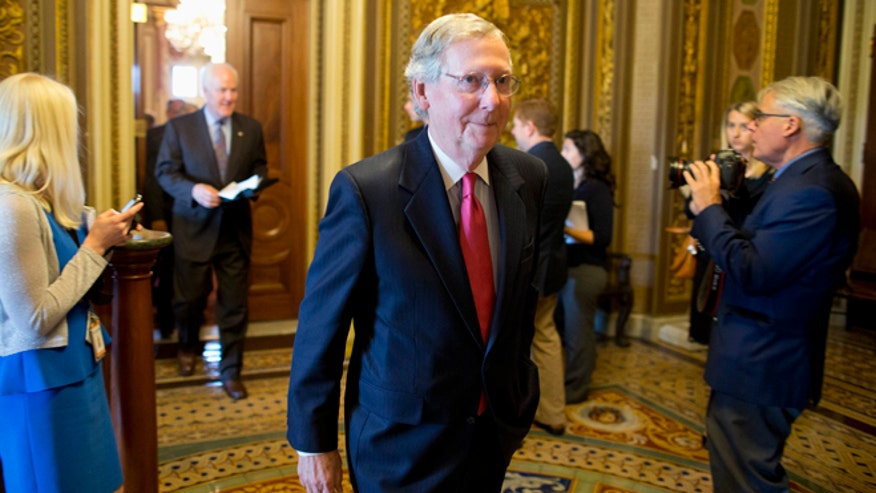
Sen. Susan Collins, R-Maine, who is helping lead the effort on the Senate side to craft an alternative proposal, said she presented a plan to the White House that would fund the government for six months and raise the debt ceiling through the end of January.
She said Obama did not say, "that's a great idea." But Collins said there were discussions about both short- and long-term approaches. She called on Obama to put out a debt-ceiling plan of his own.
Sen. Thad Cochran, R-Miss., said he was optimistic, though there were no deadlines or specifics discussed. Sen. Bob Corker, R-Tenn., called the meeting "constructive."
Sen. Tom Coburn, R-Okla., was less hopeful about the state of play. He said the meeting was not very encouraging. Though Coburn said talking is better than the alternative, the senator said he "didn't think" it helped address the debt-ceiling crisis.
The meeting -- the last of four formal sessions Obama has held this week with leaders around the Hill -- evidently did not produce a breakthrough. But sources said the action at this point appears to be happening on the Senate side.
House GOP leaders made a personal pitch to the president on Thursday, seeking a short-term increase in the debt ceiling. But after Obama pushed back, Senate Republicans came forward with a plan that would address both the debt ceiling and the partial government shutdown.
Fox News has learned the latest version would, aside from dealing with those two issues, also repeal the medical device tax -- an unpopular and costly provision of ObamaCare that the industry decries as crippling -- and include anti-fraud measures as part of the ObamaCare insurance subsidies.
The plan eases off conservatives' original demand that the health care law be defunded or delayed.
Aides said talks are still ongoing. One House Republican aide said "watch the Senate" for what comes next. The aide indicated Obama would probably evaluate proposals from Senate and House Republicans, and proceed with a plan in the Senate that could garner a large majority of votes.
"We'll get jammed again," the House aide cautioned, suggesting that the House would have to "eat" whatever the Senate brokers.
The thought is that the Republican-led House may have to pass the final bill with some Republicans and a lot of Democrats.
This could put House Speaker John Boehner in a perilous position, as he's tried to cater so far to the wishes of his Republican rank-and-file.
On the sidelines, conservatives continued to push for unraveling the health care law -- now, or in the future.
At the Values Voter Summit in Washington on Friday morning, Sen. Ted Cruz rallied conservatives against ObamaCare.
The Texas Republican senator, who along with Sen. Mike Lee, R-Utah, helped drive the showdown with the White House over ObamaCare, joked that he'd be heading next to the meeting with his colleagues at the White House, and "if I'm never seen again, please send a search-and-rescue team."
But Cruz delivered a stern message to conservatives, amid signs that GOP leaders were dialing back their demands.
"We're nearing the edge of a cliff," Cruz said, focusing his remarks almost exclusively on the health law. Cruz urged the House of Representatives to keep "standing strong."
Rep. Paul Ryan, R-Wis., in a video message at the same event, also said "we can never give up on repealing and replacing ObamaCare."
Ryan, though, appeared to be entering a key role in helping drive a possible compromise with Democrats.
"It's been slow going, but I want to make the most of this moment. We have an opportunity here to pay down our national debt and jump-start our economy," he explained. "You know, divided government is frustrating. But our country is worth the effort. We have to make it work."
Senate Republican Leader Mitch McConnell, R-Ky., who often waits until other Washington players have had their turn before stepping into tense negotiations, also began to enter the fray, true to form.
McConnell, speaking on the floor before heading to the White House, said the discussions could be a "great opportunity."
He added: "But if all the president wants is to just drag us over there to say he won't negotiate -- well that won't be particularly productive."
Join The Patriot Guard